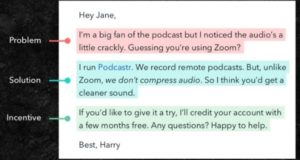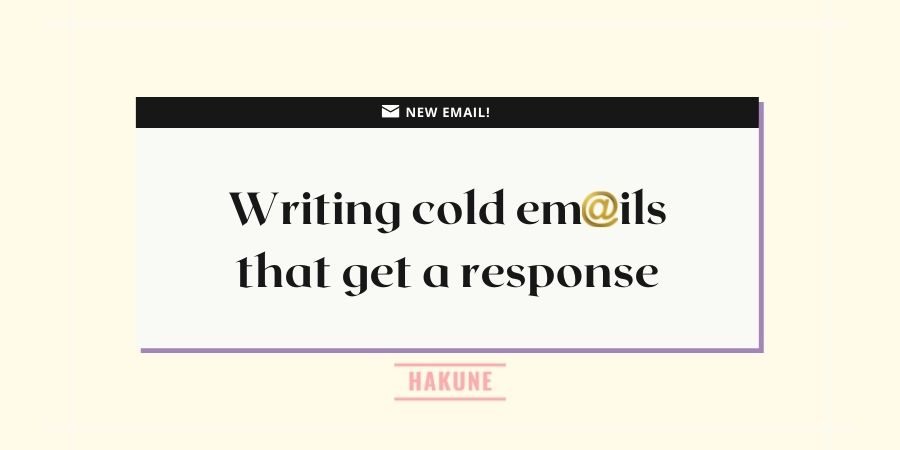The Method Episode #15

Cold Emails That Work
Most cold emails get deleted.
And even the ones that slip through cracks, if opened and written poorly, get the additional special treatment of “block sender”.
I’d hate to know how many cold emails are sent a day. Like scam calls, there’s a reason so many people try them. Sometimes they work.
Harry Dry, a well-known internet-marketer has had surprisingly good success with cold emails using these two formats.

• 60% response rate for this one when he was working for a co-working space in London.

• 35% response rate for this one when working for a podcasting broadcast platform.
These work because they’re;
• They’re conversational
• They’re concise
• They compliment
Most cold emails I receive are insincere walls of text, with little context and no clear ask.
Harry’s examples above likely take more work than they look. But are worth the effort.

Simple system to stay in touch with 100’s
When I heard Rod Drury speak at a capital raising workshop a while back.
My biggest takeaway wasn’t how to write a pitch deck or any of that business. It was how much time he’d invested into networking.
Rod launched Xero in his 40’s. And for the first 20 years of his career before Xero it sounded like networking was his number one professional priority.
He tried to help and connect with everyone he met as often as he could. Which gave him a big leg up when he was trying to get Xero off the ground.
Rod didn’t share how he maintained those 100’s of relationships but another tech entrepreneur Derick Sivers has.
“Most people are so bad at keeping in touch that they will really appreciate you doing it. And when you make this a habit, it’s easy to stay in touch with hundreds or thousands of people.“
Derek separates his contacts into priority lists and contacts them depending on priority.
A list: Very important people. Contact every three weeks.
B list: Important people. Contact every two months.
C list: Most people. Contact every six months.
D list: Demoted people. Contact once a year, to make sure you still have their correct info.
Before reaching out he;
• Spends a few minutes researching what they’ve been up to recently.
• Checks their social profiles, personal websites, and consumes any content they’ve published.
His messages are short, genuine, and (ideally) helpful.
No selling and no hidden agenda other than to keep in touch.
I’ve been slowly putting this approach into practice. Using google contacts and a weekly calendar reminder to reach out to people. So far so good.
“A bad system will beat a good person every time.”
~ W.Edwards Deming
Where We’re Learning
• The Milk Road -> Is the best and easiest to read crypto newsletter/resource I’ve found. It’s published daily and a super easy way to stay in touch with the crypto world.
• Marketing examples -> Referenced in the cold emails method above. Marketing examples has 100’s of copywriting examples, marketing case studies and other hacks. Everyone we’ve shared this resource with has enjoyed it, so hopefully you do too.

What’s The End Goal
Money is a means to an end, not the end itself.
The Sense Of Wellbeing In America might be the most in depth study on human happiness we have.
What do you think Angus found was the strongest predictor of happiness? Strong faith, close families, good friends… Not quite.
Most people thought they wanted to become wealthier to become happier. Which can mean any number of different outcomes. Fast cars, holidays, retiring your parents and so on. Super subjective right.
The one almost universal contributor to human happiness Angus found though is control. We want to be in control of our destiny.
The ability to do what we want, when we want, with who we want, for as long as we want, is the highest dividend money pays.
“Having a strong sense of controlling one’s life is a more dependable predictor of positive feelings of wellbeing than any of the objective conditions of life we have considered.”
If this is true for you, then money’s greatest value is its ability to give you control of your time. And the highest form of wealth might be being able to wake up this morning and choose to do whatever you wish.
You’ll never know if this is true for you though unless you try it for yourself. Which we struggle with. We seem to universally prefer to spend money on material stuff than we do our freedoms.
We buy nice cars, instead of vacations.
Expensive watches, instead of delivered groceries.
Stupidly big homes, instead of retirement.
Instead of building wealth to buy possessions. That is ultimately just stuff that increases our responsibilities and demands our time. It seems like we’d be better off building wealth to buy our freedom.


